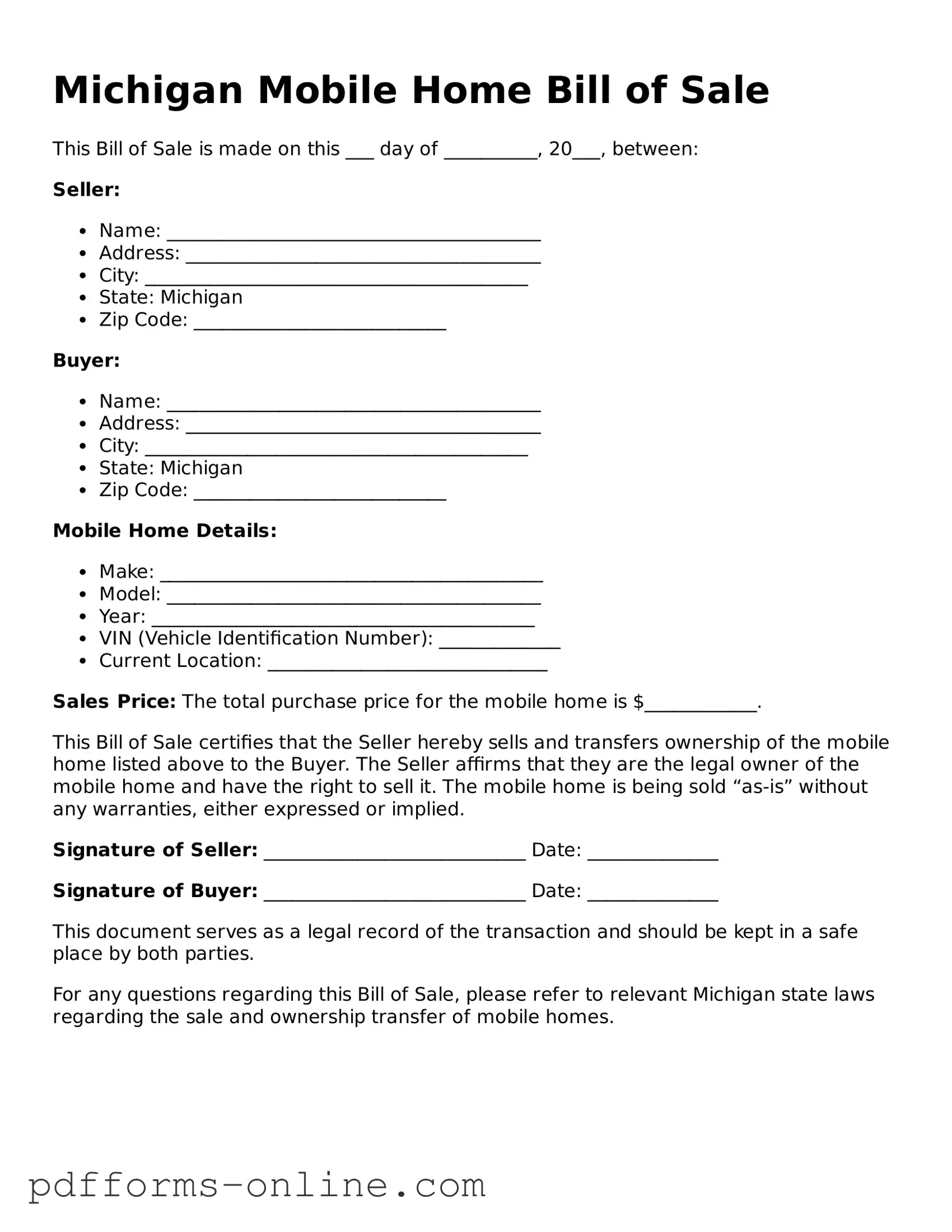The Michigan Vehicle Bill of Sale serves a similar purpose as the Mobile Home Bill of Sale. Both documents are used to transfer ownership of a specific type of property. The Vehicle Bill of Sale includes details about the vehicle, such as make, model, year, and Vehicle Identification Number (VIN). Likewise, the Mobile Home Bill of Sale contains information about the mobile home, including its make, model, and serial number. Both forms provide proof of the transaction and can be used for registration purposes.
The Michigan Real Estate Purchase Agreement is another document that shares similarities with the Mobile Home Bill of Sale. While the Mobile Home Bill of Sale is specific to mobile homes, the Real Estate Purchase Agreement pertains to real property transactions. Both documents outline the terms of sale, including the purchase price and any contingencies. They also serve as a record of the agreement between the buyer and seller, ensuring that both parties understand their rights and responsibilities.
The Michigan Lease Agreement can also be compared to the Mobile Home Bill of Sale. Both documents involve agreements related to property use. The Lease Agreement outlines the terms under which a tenant can occupy a property, while the Mobile Home Bill of Sale confirms the transfer of ownership. Both documents require signatures from the involved parties and often include important details such as duration, payment terms, and property descriptions.
The Michigan Title Transfer form is similar to the Mobile Home Bill of Sale in that both are essential for transferring ownership. The Title Transfer form is specifically used for vehicles and requires information about the vehicle and the new owner. In contrast, the Mobile Home Bill of Sale focuses on mobile homes. Both documents must be completed accurately to ensure a smooth transfer of ownership and to avoid potential legal issues.
The Michigan Affidavit of Ownership can also be likened to the Mobile Home Bill of Sale. This document is often used when the owner cannot provide a title for the property being sold. The Affidavit serves to affirm ownership and can be required in situations where the original title is lost. Similarly, the Mobile Home Bill of Sale serves as proof of ownership transfer, ensuring that the new owner can establish their rights to the mobile home.
The Access-A-Ride NYC Application form is essential for ensuring that individuals have access to necessary transportation services provided within the city. To facilitate this process, applicants are encouraged to access the document that outlines the requirements and procedures for enrollment, making it easier for potential users to take advantage of paratransit services offered by the MTA New York City Transit.
The Michigan Sales Tax Exemption Certificate is another document that may relate to the Mobile Home Bill of Sale. This certificate is used to exempt certain sales from sales tax. If a mobile home is sold under specific conditions, the buyer may use this certificate to avoid paying sales tax on the transaction. Both documents facilitate the sale process and help clarify the financial obligations of the buyer.
The Michigan Warranty Deed is comparable to the Mobile Home Bill of Sale in that both documents serve as legal instruments for transferring property. The Warranty Deed is used for real estate and guarantees that the seller has the right to sell the property and that it is free from liens. The Mobile Home Bill of Sale, while specific to mobile homes, also guarantees the transfer of ownership and protects the buyer's interests in the transaction.
Lastly, the Michigan Personal Property Bill of Sale is similar to the Mobile Home Bill of Sale. This document is used for the sale of personal property, which may include items like furniture, electronics, and vehicles. The Personal Property Bill of Sale outlines the details of the transaction, including the items sold and their condition. Like the Mobile Home Bill of Sale, it serves as a legal record of the sale and can be used to resolve disputes if they arise.
